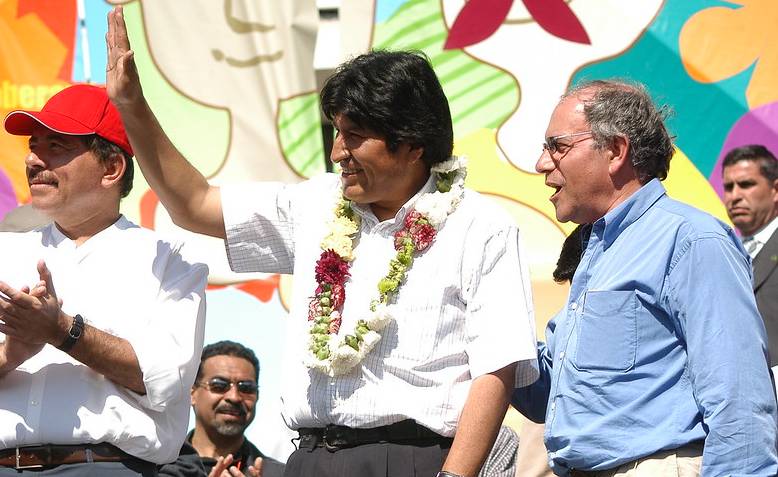 Ortega, Evo Morales and Tomás (2005). Photo: Flickr - Tomas Hirsch G. / cropped from original / licensed under CC 2.0, links at the bottom of article
Ortega, Evo Morales and Tomás (2005). Photo: Flickr - Tomas Hirsch G. / cropped from original / licensed under CC 2.0, links at the bottom of article
The return of Evo Morales to Bolivia symbolises the defeat of the Washington-driven coup following the election last month, writes John Clarke
The October 18 Bolivian election result was a shattering defeat for US imperialism, its Canadian junior partner and for the local elites in the country that operated the reactionary coup regime. The Movement for Socialism (MAS) was returned to power, not simply by the casting of ballots, but through a massive and defiant social resistance that defeated all plans for a safe electoral process the coup leaders could control and dominate.
On November 8, Luis Arce and David Choquehuanca, the newly elected president and vice-president, took office. For good measure, the Chamber of Deputies and the Senate both have clear MAS majorities. Before his inauguration, Arce stated that
“We have reclaimed democracy for Bolivia, and our message is that we will not tolerate any kind of de facto dictatorial regime or coup in Latin America.”
He made clear that relations with Cuba and Venezuela, broken off by the coup leaders, would be fully restored. Arce acknowledged the huge damage that has been done to the Bolivian economy by the impact of the pandemic and by the ruinous neoliberal policies pursued during the year the coup regime was in power. “We are seeing hunger, we are seeing a health crisis that has deepened the structures of poverty in our country, and we have an educational crisis that deserves everyone’s attention,” he said.
Having been driven into exile by the architects of the coup, the previous MAS president, Evo Morales, had the way for his return to Bolivia opened up when, shortly after the election, a court annulled the charges of sedition and terrorism that the usurpers had laid against him. Thousands greeted him as he crossed the border from Argentina into Bolivia. “As long as capitalism and imperialism exist, the fight goes on,” he said, as he prepared to enter the country.
In January, coup leader, Jeanine Áñez, had asked for support in keeping ‘the savages’ from regaining power. This racist insult was crudely directed at the Indigenous people who make up the majority of Bolivia’s population. “The Bolivian right and the global right should know: the savages are back in government. We’re in power now.” Morales told a huge crowd in the town of Chimoré.
The Venezuelan embassy in Bolivia’s capital city, La Paz, had been taken over by representatives of Washington’s stooge ‘interim president,’ Juan Guaidó, with the full backing of the coup leaders. On November 9, a Venezuelan delegation, headed by that country’s foreign minister, Jorge Arreaza, were able to recover the embassy. A photo of Guaidó was removed from one of the walls and, in its place, a picture of Simón Bolívar, the Liberator, was put up. Doubtless, there would have been plenty of fear and loathing in Washington’s corridors of power at this act of defiance.
One of the clearest indications of how ready the MAS government will be to confront its domestic enemies and their North American backers, is the approach that is taken to dealing with those who led the coup regime. During the period in which they held illegitimate power, poor and working-class Bolivians paid dearly for resisting their rule. Lethal repression, with many detained and tortured, was inflicted on those who refused to submit.
MAS has returned to power because that resistance proved to be unbreakable. The Bolivian parliament has approved a report that recommends ‘a judgement of responsibility against Jeanine Áñez for genocide and other offences.’ Clearly, an uncompromising and determined way forward in the struggle against capitalism and imperialism that Morales has spoken of must include ensuring that those who tried to drown that struggle in blood face justice for their crimes.
It would be folly to imagine that the US and Canadian governments and North American mining companies, along with local elites and security forces, will be reconciled to the defeat they have suffered in Bolivia. The country is too rich a prize in its own right for this to happen but, even more, a model of resistance has been created for the entire region that can’t be permitted.
The incoming Biden Administration offers no relief in this regard. On the contrary, Biden is a notorious hawk, when it comes to foreign policy, who is far more trusted by the US military and intelligence agencies than Trump was. He will be a more competent champion of US global domination than that his erratic and incompetent predecessor. The cabinet that Biden assembles will be making the restoration of a compliant regime in Bolivia one of its top priorities.
Those who want to overthrow the MAS government will seize upon any weakness and every false hope in a conciliatory approach. The way forward lies in mobilising the mass of poor and Indigenous Bolivians who resisted the coup so courageously behind a bold socialist programme and by uniting with all those throughout Latin America who resist the ‘Washington Consensus’ and its hated agenda of domination and exploitation.
Join Revolution! May Day weekender in London
The world is changing fast. From tariffs and trade wars to the continuing genocide in Gaza to Starmer’s austerity 2.0.
Revolution! on Saturday 3 – Sunday 4 May brings together leading activists and authors to discuss the key questions of the moment and chart a strategy for the left.

